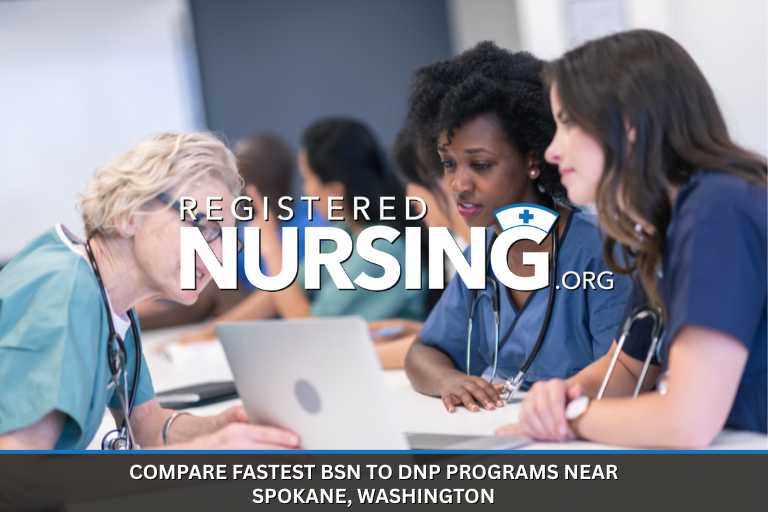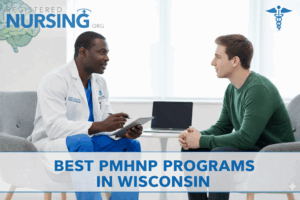Compare Fastest BSN to DNP Programs Near Spokane, Washington
- 2026 Fastest BSN-to-DNP Programs Near Spokane, Washington
- Why Choose a BSN to DNP Program in Spokane?
- What Makes These Programs the "Fastest"?
- Popular Specializations for Spokane-Based Nurses
- Clinical Placements in the Spokane Region
- Admission Requirements and Applicant Profile
- Balancing Speed and Flexibility
- Career Outcomes for DNP Graduates in Spokane
- Navigating Cost and Financial Aid
- Spokane's Role in Training the Next Generation of Nurse Leaders
- Sources
- Latest Articles & Guides

In Washington's Inland Northwest, Spokane has emerged as a hub for advanced nursing education and healthcare innovation. For registered nurses (RNs) holding a Bachelor of Science in Nursing (BSN) who are ready to pursue the highest level of clinical practice, BSN to Doctor of Nursing Practice (DNP) programs offer a direct, comprehensive path. Designed to streamline the journey from bedside to leadership, these programs prepare nurses for advanced roles in practice, policy, and systems-level change, all without requiring a separate MSN degree.
Nationwide, the demand for doctorally prepared nurses is climbing. The American Association of Nurse Practitioners reports that more than 355,000 licensed nurse practitioners are now active in the United States, with rapid growth driven by provider shortages and expanded healthcare access. In Washington, where rural counties remain medically underserved, fast-track BSN to DNP programs are a vital solution. Spokane, with its blend of clinical access and academic opportunity, is uniquely positioned to help fill this need.
2026 Fastest BSN-to-DNP Programs Near Spokane, Washington
Gonzaga University
Spokane, WA - Private 4-year - gonzaga.edu
BSN to DNP - Post-Baccalaureate DNP Family Nurse Practitioner
Online Learning - Visit Website
Gonzaga University's Post-Baccalaureate DNP Family Nurse Practitioner program stands out for its accelerated pathway and comprehensive clinical preparation. Designed for experienced nurses seeking advanced practice roles, the program offers an efficient 5-year completion timeline with strategic online learning and minimal on-campus immersions. Students benefit from 1,000 practicum hours across diverse healthcare settings, ensuring robust real-world experience. The 78-credit curriculum emphasizes evidence-based practice and prepares graduates for national certification. Unique program attributes include faculty-supported clinical site visits and flexible learning modalities, allowing working professionals to advance their nursing careers without significant workplace disruption. The program's strategic design enables faster progression compared to traditional DNP tracks.
- 78 Total Credits
- 1,000 Clinical Practicum Hours
- Average 5-Year Completion
- Online with On-Campus Immersions
- National Certification Eligible
- Multi-Setting Clinical Preparation
- Advanced Health Assessment Focus
- $1,170 Per Credit
- 8 On-Campus Immersions
- Faculty Clinical Site Visits
Why Choose a BSN to DNP Program in Spokane?
Spokane's healthcare infrastructure, academic resources, and regional healthcare demands make it an ideal city for nurses aiming to advance their careers. The city is home to a diverse mix of healthcare systems, including critical access hospitals, outpatient clinics, and specialized care facilities serving eastern Washington and northern Idaho.
With ongoing provider shortages and increasing demand for primary care, the Spokane region urgently needs doctorally prepared nurses. According to the Washington Center for Nursing, the state is expected to face a shortfall of thousands of nurses by 2031. BSN to DNP programs help close this gap by training nurse practitioners (NPs), nurse leaders, and clinical experts ready to serve high-need populations in both urban and rural settings.
What Makes These Programs the "Fastest"?
Accelerated BSN to DNP programs are designed for efficiency without compromising academic rigor. These tracks allow BSN-prepared RNs to bypass the traditional MSN, integrating advanced practice preparation and doctoral coursework into a single, cohesive curriculum.
Fast-track options may be completed in as few as 3 to 4 years full-time, depending on the specialization and format. Some programs offer part-time or hybrid models, but the fastest pathways often require year-round, full-time study.
Key Features of Fast-Track BSN to DNP Programs
| Feature | Description |
| Integrated Curriculum | Combines MSN-level and doctoral-level coursework into a streamlined format |
| Clinical Hour Completion | 1,000+ hours completed across a variety of practice settings |
| Scholarly DNP Project | Capstone project addressing a local or regional healthcare challenge |
| Specialization Tracks | Options such as FNP, PMHNP, AGACNP, or leadership-focused pathways |
These programs are designed for high-achieving nurses ready to step into leadership and practice authority as quickly as possible.
Popular Specializations for Spokane-Based Nurses
Spokane's geographic and demographic profile creates demand for a range of advanced nursing specializations. DNP students can tailor their focus based on regional healthcare needs and their own career goals.
High-Demand Specializations Include:
- Family Nurse Practitioner (FNP): Primary care providers for patients of all ages, particularly in underserved communities.
- Psychiatric-Mental Health Nurse Practitioner (PMHNP): Delivering critical mental health services across outpatient, inpatient, and telehealth platforms.
- Adult-Gerontology Acute Care Nurse Practitioner (AGACNP): Managing complex, high-acuity patient populations in hospital settings.
- Nurse Executive or Leadership Tracks: Driving quality improvement, managing teams, and shaping healthcare policy.
These roles are increasingly essential as Spokane's health systems respond to aging populations, chronic disease, and mental health access gaps.
Clinical Placements in the Spokane Region
Hands-on experience is a cornerstone of every BSN to DNP program. In Spokane, clinical placements are strategically aligned with both student learning outcomes and regional care needs.
Students may gain clinical experience in:
- Urban trauma centers and medical-surgical hospitals
- Critical access hospitals in surrounding rural counties
- Behavioral health centers and substance use recovery clinics
- Community clinics serving low-income or immigrant populations
Exposure to these diverse settings allows students to apply classroom knowledge in real-world situations, develop cultural competence, and contribute to healthcare equity in eastern Washington.
Admission Requirements and Applicant Profile
BSN to DNP applicants in Spokane are typically practicing nurses with strong academic and professional backgrounds. Admissions processes are competitive, especially for high-demand specialty tracks.
Common Admissions Requirements:
- BSN degree from an accredited institution
- Active RN license in Washington or eligible for reciprocity
- Minimum GPA of 3.0 (higher for some specialties)
- Two to three professional letters of recommendation
- Current resume/CV with clinical and leadership experience
- Personal statement of intent and alignment with DNP competencies
Many programs prefer or require at least one year of RN experience. Applicants targeting AGACNP or executive leadership tracks may need more.
Balancing Speed and Flexibility
For nurses balancing work and family responsibilities, flexibility is critical, even in fast-track programs. Spokane-based DNP pathways increasingly offer hybrid or part-time formats to accommodate different learner needs.
Spokane Program Format Options:
| Format Type | Details |
| Full-Time | Fastest path to completion (3–4 years), usually requires year-round study |
| Part-Time | Slower pace (5–6 years), ideal for working nurses |
| Hybrid Delivery | Combines online coursework with in-person clinical experiences |
| Executive Format | Designed for nurse leaders with prior administrative experience |
These flexible models ensure that nurses across career stages can pursue a DNP without sacrificing stability or work-life balance.
Career Outcomes for DNP Graduates in Spokane
Doctorally prepared nurses are in high demand in Spokane and throughout Washington. The DNP credential supports clinical, academic, and administrative advancement, often leading to increased autonomy, higher salaries, and leadership opportunities.
Common Career Paths:
- Primary Care Nurse Practitioner in outpatient clinics or family practice
- Acute Care NP in trauma centers or specialty hospitals
- Behavioral Health NP in crisis intervention or community mental health
- Chief Nursing Officer or Director of Nursing in regional health systems
- Nursing Faculty or Preceptor in Spokane's expanding education networks
The Bureau of Labor Statistics reports an average salary of over $130,000 annually for nurse practitioners in Washington, with top earners in metropolitan and leadership roles.
Navigating Cost and Financial Aid
The cost of a BSN to DNP program can be significant, but Spokane-based nurses can access multiple forms of financial aid. Scholarships, service-based funding, and employer reimbursement make DNP education more accessible.
Funding Options for Spokane Students:
| Funding Source | Description |
| Federal Financial Aid | FAFSA-based aid for graduate students, including loans |
| Nurse Corps Scholarship Program | National program supporting students who commit to working in shortage areas |
| Washington State Loan Repayment | Incentives for NPs serving in rural and underserved communities |
| Employer Tuition Assistance | Regional health systems may fund employee education |
Early application for aid and proactive communication with program financial aid offices can improve access to these resources.
Spokane's Role in Training the Next Generation of Nurse Leaders
Spokane plays a vital role in shaping the future of healthcare across eastern Washington. As more nurses pursue doctoral-level preparation, the city's clinical partnerships, academic institutions, and public health initiatives offer a supportive foundation for career advancement.
BSN to DNP programs in Spokane prepare nurses not only to practice, but to lead. Whether stepping into high-impact clinical roles or shaping policy at the systems level, DNP graduates are equipped to meet complex challenges with innovation, compassion, and evidence-based strategies.
Choosing a nursing program in Washington is more than a time-saving measure; it's a meaningful step toward long-term impact in a dynamic healthcare region.
Sources
- Washington Center for Nursing
- Bureau of Labor Statistics: Nurse Practitioners
- American Association of Nurse Practitioners
- National Rural Health Association
Latest Articles & Guides
One of the keys to success as a registered nurse is embracing lifelong learning. Our articles and guides address hot topics and current events in nursing, from education to career mobility and beyond. No matter where you are on your nursing journey, there’s an article to help you build your knowledge base.
Browse our latest articles, curated specifically for modern nurses.



